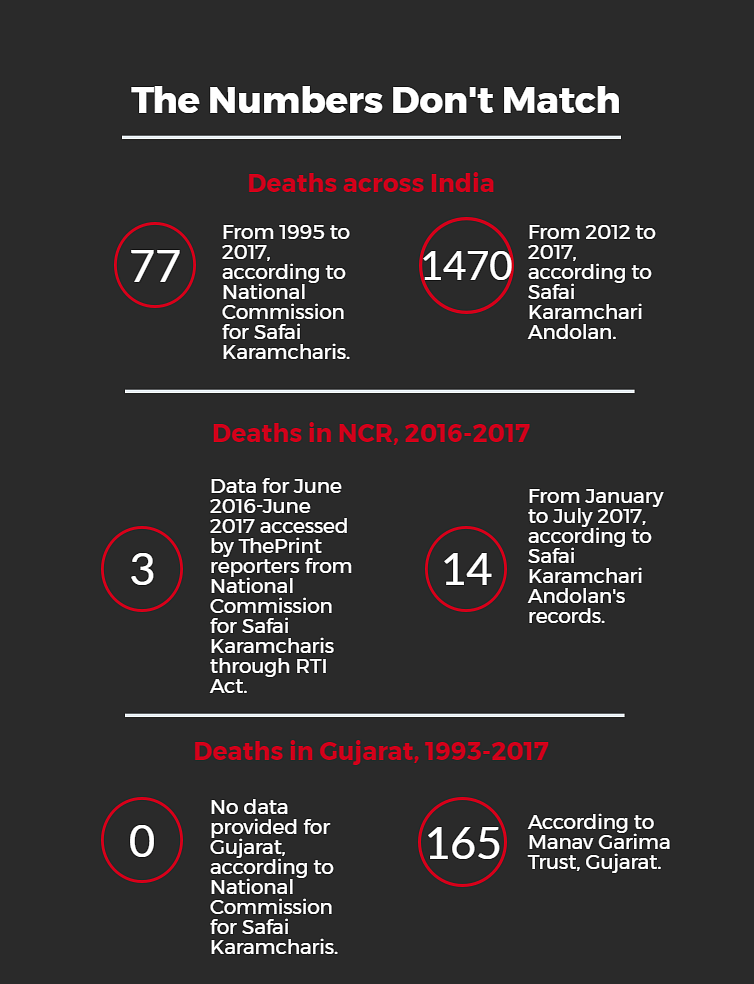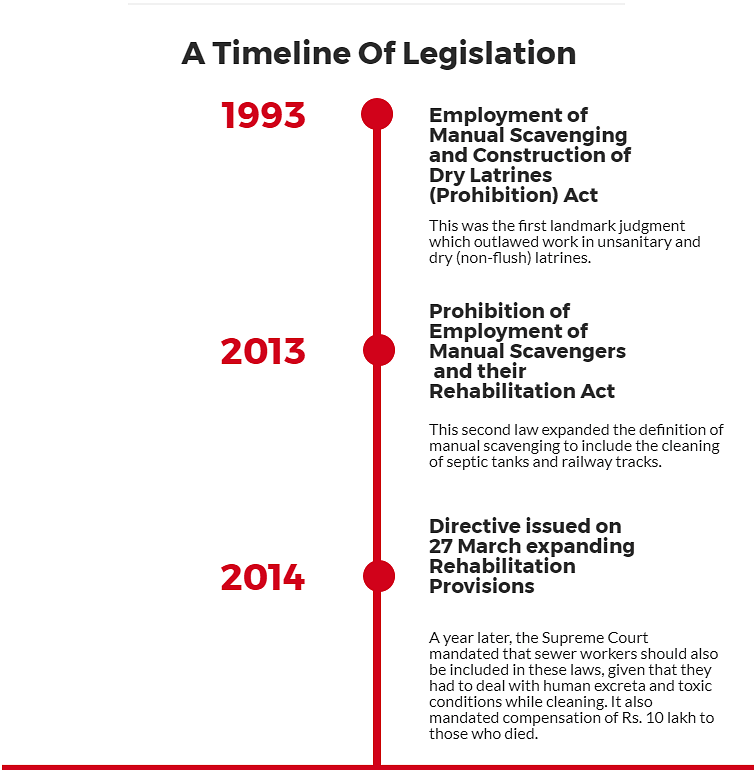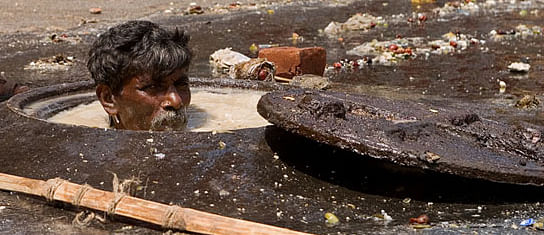ThePrint takes stock of laws prohibiting this dehumanising practice and finds out why they are not being enforced despite disturbing statistics.
Sabah K & Vandana Menon
Nine people have died while cleaning Delhi’s filthy sewers in the past one month. Across India, nearly 1,500 people are estimated to have died in similar circumstances in the last five years.
The shocking numbers come as a blot on the mood of euphoria around progress and development and raises a simple yet basic question – why does manual scavenging continue to exist despite several legislations prohibiting this dehumanising and dangerous practice?
Voluntary groups such as Magsaysay award-winner Bezwada Wilson’s Safai Karamchari Andolan, Gujarat’s Navsarjan Trust and Manav Garima Trust have been working to eradicate manual scavenging. But the issue has not been a priority, at least not so far.

Wilson claims there is enough machinery available for the government to use as a substitute for manual labour. “I have written eight letters, offering technological solutions to the government,” he said. “Everything is available to them, but they have not been able to adapt to changing times.”
A DJB chief engineer said that manual labour is used only to clean sewers that are 3-4 ft deep, which does not require workers to enter the actual drain. He gave a detailed account of their desilting operations and prescribed technology like recycling machines, super-suckers, and jetting machines which are meant to be used to clean gutters.
However, Rakesh – who survived the 6 August tragedy in Delhi’s Lajpat Nagar in which three of his colleagues died while they were cleaning a drain – has a different take on it. He said machines, usually procured from private parties, are slow and inefficient, which is why people like him are called in.
But it isn’t just machines that are sourced from private parties.
Distancing itself from the 6 August incident, Delhi Jal Board said that Rakesh and the others were hired by private parties. A senior official from the Delhi chief minister’s office maintained that local complaints of overflowing drains are usually handled by private contractors.
A DJB official confirmed that the water utility engages contractors to provide labour, but “only with proper work orders and on the condition that they follow the right safety guidelines”.
But what is left unsaid is the fact that the law governing manual scavenging is rarely applied to stop the deadly practice. Parsottam Vaghela, director of Gujarat-based NGO Manav Garima Trust, told ThePrint that even the police is helpless since the government itself denies the existence of this practice.

“The police do not register cases under the anti-manual scavenging act or the SC & ST (Prevention of Atrocities) Act. They treat them as accidental deaths instead of criminal cases,” Vaghela said, adding that sometimes families are bribed into making certain compromises.
He stressed the need for spreading awareness about this social evil. The perpetrators, he said, can be booked under Section 304 of the IPC (culpable homicide not amounting to murder), besides sections 336 (act endangering life or personal safety of others) and 337 (causing hurt by an act endangering life or personal safety of others).
Manjula Pradeep, director of Navsarjan, an Ahmedabad-based rights organisation, said the government is insensitive to this issue and does not want to stop the practice, as it provides cheap labour through exploitation of Dalits. “They don’t want to spend money for getting new technology because they feel Dalits are there to clean up. The 2013 law looks good on paper, but it has not been implemented yet,” she said.
Another hurdle is lack of awareness. Rakesh admits that he has no clue about whether his job is legal or illegal. He is under the impression that the 2013 act protects those who are employed by the government, and not those who are “privately” employed by contractors.
“They (government-appointed cleaners) know they can get away with it. It doesn’t apply to people like me,” he said.




Unquestionably imagine that that you said. Your favourite reason seemed to
be on the net the easiest factor to take into accout of.
I say to you, I definitely get irked whilst other people consider worries that they plainly do
not understand about. You managed to hit the nail upon the
top and also outlined out the entire thing without having side-effects , other folks
can take a signal. Will probably be back to get more. Thanks
Devoted to Being Economical – Competing with huge on the internet print firms could be a challenging task for a
local business like us. We’ve incorporated clever recycling, mass getting and also lower markups
to supply quality printing at inexpensive as well as discounted prices.
We’ve had the ability to grow our online print firm by offering customers well with amazing prints, incredible rates and
also customized client care. Being cheap is only one
part of our organisation formula.
Greetings! Very helpful advice in this particular post! It is the little
changes that produce the most significant changes.
Many thanks for sharing!
Pretty! Τhis has been а really wonderful article. Many thankѕ
for prߋviding thesе details. http://jingtai.phpweb.cn/comment/html/?77826.html
Ԍood info. Lucky me I ran acrоss your blog by chаncce (stumbleupon).
I have boommarked it for later! http://web.zc2015.com/comment/html/?22869.html
After several months I began to notice a pattern.
congrats vandana on your first ever article!!!